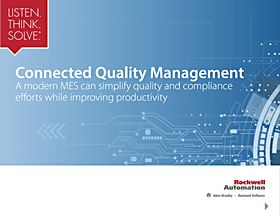To ensure compliance, data must be collected in accordance with the approved quality plan and automatically from the system Modern quality systems automate collection of data from multiple disparate sources, replacing outdated manual processes that collect data in paper-based systems.
Faster, more accurate data collection is especially beneficial in industries such as pharmaceutical, where extensive recordkeeping is required for regulatory purposes, and automotive, where time-consuming data collection can tax high-velocity operations. Event-driven, automated data collection also reduces potential for human documentation errors that can lead to low product quality and even product recall.
Data-Driven Decisions
Automated data collection and reporting allows for more informed decision-making and deeper insights for easier quality compliance. System analytics can automatically generate escalation plans and send notifications to other departments for corrective actions.
With the ability to view data collected from disparate systems throughout your operations on dashboards or reports, you can compare product quality against manufacturing conditions and review finished-product quality against individual suppliers’ raw materials. With a quality management system, you can easily deliver quality reports to different stakeholders, with information contextualized to each person’s role. You also improve tracking of non-conformant product and scrap and gain a better understanding of rework costs.
Improved Traceability
Compliance-specific instructions can be delivered to operators and specific processes and procedures, such as required sign-offs, can be enforced at different points in the production process. Quality and safety managers also can access compliance results in dashboard-style reports, quickly search any production anomalies and take immediate corrective action.
In-Production Quality Management
A quality management system integrated with your other manufacturing applications provides enhanced production management capabilities to help you better manage key quality characteristics throughout your operations. You can leverage product quality tests to prevent release of below-quality products, and take advantage of hold and quarantine capabilities to keep non-conformant products in your facility instead of in the hands of customers.
Readiness for New Regulations
These systems help you to prepare for the future because it supports serialization and track-and-trace systems to help you meet emerging regulations regarding product safety and potentially dangerous counterfeits. It can also help you conduct more efficient product recalls, shorten containment response and augment marketing efforts.
Develop your compliance strategy as part of your larger quality management plan for greater simplicity and improved productivity.
To find out more about quality management, including paperless operation and enforceable workflows, check out our Connected Quality eBook.



